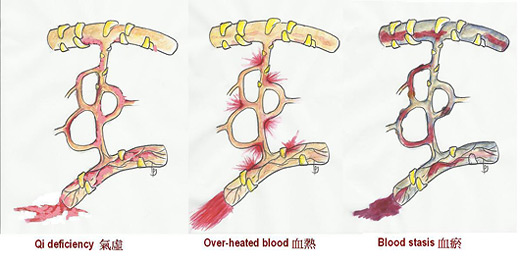In TCM,
blood is viewed simply as the red fluid circulating within the vessels; it relies on the regulations of
internal organs to distribute efficiently throughout the body. Blood is transformed by the
spleen; stored by the
liver; pushed by the
heart; disseminated by the
lungs; and transformed into life
essence by the
kidneys. Moreover,
qi (vital energy) plays an essential part in the blood activities; qi not only moves blood around the body, but also helps promote its production and hold it in the vessels as well. Internal disharmonies that are likely to develop bleeding complications are:
- Qi deficiency: makes the blood vessels become fragile and unable to contain blood;
- Excessive heat: damages the blood vessels and results in “reckless” movement of hot blood;
- Blood stasis: causes obstructions in the blood vessels and forces blood to outflow from its normal pathways.

TCM views on the development of bleeding
Generally, the above can be due to external pathogens, improper diet, emotional strain or internal organ problems; these factors affect different body regions, organs and
meridians, and lead to a variety of bleeding problems.
Invasion of external pathogens
External pathogens are related to seasons or environment. When
external heat evils enter the blood and damage the blood vessels, it will cause blood to exude. For other pathogens like coldness, dampness or wind, they usually join up with heat evils or transform into internal heat evils when causing bleeding. Wind, heat and dryness evils are likely to affect the upper body and cause symptoms such as nosebleeds, coughing up blood and vomiting blood. While vaginal bleeding, bloody stool or blood in the urine that occur in the lower body can also due to
damp heat evils.
Pestilential evil is a kind of pathogenic factor with intense infectivity, which can lead to bleeding under the skin.
Improper diet
Improper diet such as over consumption of alcohol, hot and spicy foods can make the intestines accumulate heat or damp-heat evils. When the pathogens damage the blood vessels, disturb the flow of blood, there will be vomiting blood, nosebleed or bloody stool. Moreover, unhealthy diet habits also weaken the spleen, affect its production of qi (vital energy), and make the body unable to keep blood flowing properly inside the vessels, resulting in bleeding.
Emotional distress
Excessive and prolonged
emotional problems are considered the major internal causes of disease in TCM. Anger or stress impairs the movement of qi and leads to liver stagnation, which can interfere with
stomach function, and result in vomiting blood. As time passes, a stagnated liver will generate fire that may attack the lungs and cause coughing up blood or nosebleeds. On the other hand, excess anxiety or over thinking disturbs the heart, which generates fire to irritate the
bladder or
small intestine, leading to blood in the urine.
Unbalanced lifestyle
Anything undertaking to extreme will harm the body and result in disharmony. For example, over-thinking impairs the heart; too much physical work impairs the spleen; unlimited sexual activities impair the kidneys. An overstrained body usually presents with qi and yin deficiencies. Qi deficiency can make the body fail to keep the blood flowing properly; while yin deficiency can cause the body to create
virtual fire and also affect blood flow.
Feverish and chronic diseases
Feverish and chronic diseases consume the fundamental substances of the body and may result in bleeding problems. For example, depletion of body fluids or blood leads to
yin deficiency; when virtual fire is generated and damaged the blood vessels, bleeding will occur. Qi depletion is common during the development of diseases, there will be insufficient qi to keep blood flow properly within the vessels, and blood can escape easily. Furthermore, a prolonged illness usually involves the formation of blood stasis that forces blood to outflow from its normal pathways.
 TCM views on the development of bleeding
Generally, the above can be due to external pathogens, improper diet, emotional strain or internal organ problems; these factors affect different body regions, organs and meridians, and lead to a variety of bleeding problems.
TCM views on the development of bleeding
Generally, the above can be due to external pathogens, improper diet, emotional strain or internal organ problems; these factors affect different body regions, organs and meridians, and lead to a variety of bleeding problems.


